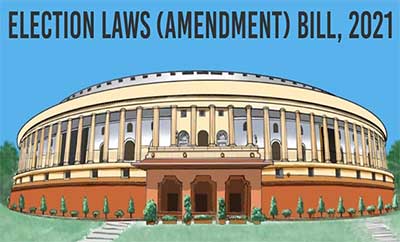Relevance: GS-2: Salient features of the Representation of People’s Act; Power, functions and responsibilities of various Constitutional Bodies.
Key phrases: Electoral rolls , Aadhaar Database, Right to Information, Election Commission, Political profiling, Unique Identification Authority of India (UIDAI)
Why in News ?
- Recently, both the houses of Parliament have passed a Bill that seeks to amend both The Representation of the People Acts of 1950 and 1951. A key amendment is related to linking the electoral rolls with the Aadhaar Database.
Key clauses in the Bill
- The Bill enables the voter registration officer to require applicants for inclusion of their names in the voters’ list, as well as those already enrolled in it, to submit their Aadhaar numbers.
- The Bill also increases the number of qualifying dates for the revision of electoral rolls from one per year to four. At present, January 1 of each year is the qualifying date. Every year, those turning 18 on or before that day are eligible to be a voter. This has been amended to include April 1, July 1 and October 1 so that one need not wait for the end of the year to apply for inclusion.
- The Bill replaces the word ‘wife’ to ‘spouse’ to make the laws gender-neutral.
- Other clauses related to the requisition of any premises for the storage of election material, accommodation for security forces and election personnel.
Is Aadhaar-voter ID link mandatory ?
- The step is voluntary in nature to the extent that it says that no person can be denied inclusion in the electoral roll or any entry deleted because of the inability of an individual to furnish Aadhaar number.
- However, such inability or non-submission must have “sufficient cause as may be prescribed”.
- This means that a separate rule will be prescribed to list the possible reasons that may constitute “sufficient cause” for an applicant or voter not to submit their Aadhaar number.
Government Arguments
- The need is to verify the identity of voters by linking the Aadhaar database, which contains the unique identification numbers of every resident in the country, with the details contained in the electoral rolls.
- This will help weed out bogus voters, non-citizens being wrongfully included as voters.
- And rectify those who figure in the electoral rolls in more than one constituency.
Objections to the Bill
- According to experts, Bill violates individual privacy by mandating the linking of Aadhaar details with voter identity cards.
- It goes against the spirit of the Supreme Court judgment that limits the use of Aadhaar to the financial and welfare benefits given by the government, and bars the unnecessary expansion of the scope of Aadhaar to other areas of life.
- It may lead to large-scale deletion of names either inadvertently or deliberate targeting.
- It is not really voluntary, as only a set of reasons to be prescribed later can be given for those who cannot or do not wish to give their Aadhaar number.
- It may help political parties to profile voters as favourable or unfavourable.
- Activists claim that the Aadhaar database is strewn with errors and therefore linking it to the voters’ list will result in severe omission errors.
- In fact, both the Calcutta High Court and the Allahabad High Court recently have refused to rely on the authenticity of Aadhaar data.
- The voter registration officer clearly has uncanalised discretion — since the law does not prescribe any guiding principles — to decide when an Aadhaar number may be “required”.
Case Study of Telangana and Andhra Pradesh
- In 2018, the data used by the Election Commission to curate electoral rolls in Telangana and Andhra Pradesh through the help of Aadhaar database.
- Nearly two lakh residents found that their names were deleted from the list of voters.
- Right to Information replies indicated that such deletion was carried out without any door-to-door verification of the identity of individuals.
- The Supreme Court of India had to finally intervene to stop the linking process.
Case Study of Puducherry
- Case of political profiling using Aadhaar data in Puducherry.
- In April 2021, the Madras High Court asked the Unique Identification Authority of India (UIDAI) to ascertain how confidential information held by it may have been leaked.
- There are “credible allegations” that only mobile phones linked to Aadhar cards received bulk SMS messages to join WhatsApp groups of a particular political party during election campaigning in Puducherry.
Conclusion:
- The need, therefore, is to implement legislation through dialogue and discussions; a top-down approach may be counter productive, as seen in implementation of three Farm Laws. The need is the inclusive and consensus based electoral reforms to transform our democracy from procedural to substantive one.
Mains Question:
Q. What are the important provisions of the Election Laws (Amendment) Bill, 2021. Despite its significance to rectify the electoral database, there are many objections raised on the provisions of the Bill. Discuss. (10 marks)
Source: The Hindu







